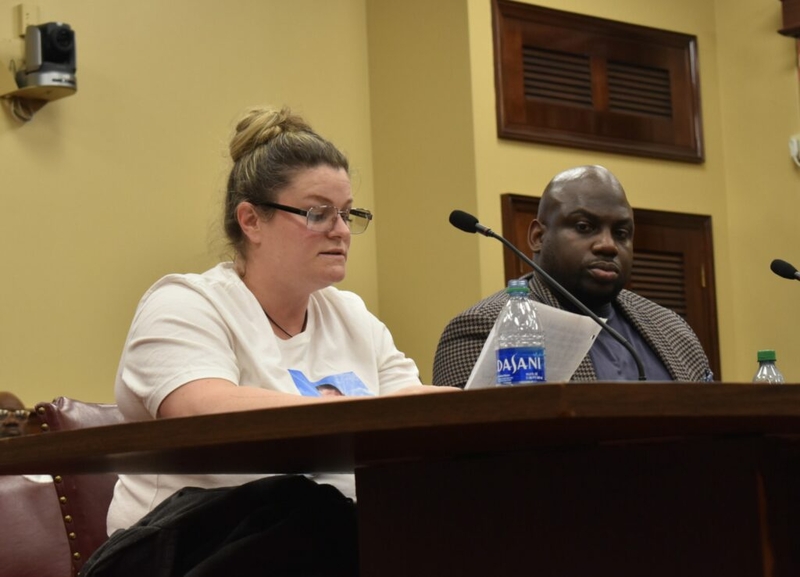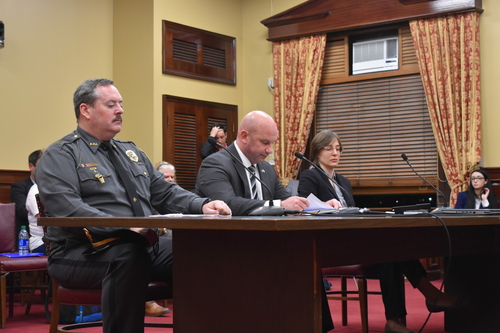The push to reform solitary confinement in Rhode Island

A bed, toilet, sink, small desk, and a skinny window to the outside.
For 23 hours a day, 21 days in a row, these were the only views Brandon Robinson saw during his time in restrictive housing at the Adult Correctional Institutions (ACI) in Cranston. He was allowed one hour a day outside his 8 x 10-foot cell.
It was torture, he said.
“This was sensory deprivation,” Robinson said in an interview. “It was a wake up call for me. This is beyond holding someone accountable — people are already punished for what they did when they get put in prison.”
This legislative session, lawmakers are seeking to amend the system with S0617, also known as the “Solitary Confinement Reform Act.” The bill sponsored by Democratic Sen. Jonathon Acosta of Central Falls would restrict the use of solitary confinement for violent offenses and ban its use for inmates with developmental or behavioral disabilities.
“This bill is not about banning solitary confinement,” he said. “It’s about reforming the system to ensure accountability and ensure the practice is used as a last resort.”
The title of the bill uses a commonly known term that corrections professionals have replaced with restrictive housing, an umbrella term that includes a variety of practices to sanction inmates inside its facilities.
“This is not a matter of semantics where the practice goes by different names, it literally does not exist,” Department of Corrections (DOC) spokesperson J.R. Ventura said. “We do not isolate people — we discourage dangerous and predatory behavior by removing privileges, and not by sensory deprivation as some claim. Any statement to the contrary is not accurate.”
A companion bill, H6161, was filed in the State House by Pawtucket Rep. Leonela Felix.
“This is a starting point,” Felix said. “Just because you lose your freedom doesn’t mean that you should lose everything else.”
Objections from DOC
Testifying before the Senate Judiciary Committee on March 21, acting DOC Director Wayne Salisbury said the bill is too broad to be applied to Rhode Island and could lead to “disastrous results.”
Salisbury said that similar reforms in New York passed in 2021 have led to more than 1,000 assault incidents against staff members — with overall prison violence going up 22%.
“We deal with real people with real issues,” he said.

On any given day, restrictive housing impacts about 5% of the incarcerated population, according to the DOC. As of Dec. 31, 2022, 71 inmates were placed in restrictive housing.
The department says removing violent or disruptive inmates from the general population is a necessary tool to protect the incarcerated persons “who abide by the rules of our facilities and respect their peers and the staff.”
Robinson understands those arguments. But he said it’s also important to let inmates keep their humanity and sanity.
“Who is going to care enough to break this cycle?”
Under the bill, inmates with mental illness should be diverted from administrative confinement and placed in a clinically appropriate alternative form of housing.
Should a prisoner enter restrictive housing, they will be required to be seen and assessed by a qualified mental health professional or health care professional within 72 hours of placement and at least every 14 days thereafter.
According to a 2019 report from Columbia University, suicidal thoughts, depression, and attentional and memory deficits are just a few examples of the mental anguish that people incarcerated in extreme isolation can suffer — especially under medium to long-term extreme isolation.
“This is when a person begins to lose their sense of reality,” Robinson said. “They start to hallucinate and talk to themselves — they become very paranoid.”
This was the case for Charlene Liberty, a former inmate at the Women’s Prison who died in 2022, less than two months after she was discharged from the psychiatric wing of Eleanor Slater Hospital. There is no official ruling on the cause of Liberty’s death, though her family alleges that her time in solitary confinement was a contributor.
Elisha Liberty, Charlene’s sister, testified before the Senate Judiciary Committee about the effects of solitary confinement on her sister’s mental health. She said Liberty was seeing things on walls and hearing voices that weren’t there.
Charlene Liberty submitted multiple grievances to prison officials, only to be “completely ignored” and attempted suicide multiple times only to return to isolation as punishment, Elisha said.
“And the vicious cycle begins again,” Elisha Liberty said.
Liberty’s treatment in solitary confinement, along with five other inmates, is the subject of an ongoing class-action lawsuit in U.S. District Court.
Corrections spokesperson Ventura could not comment on the ongoing litigation, but said there are suicide watch procedures for inmates who are at risk of harming themselves.
According to the lawsuit, correctional officers pepper sprayed Liberty and ordered “that she be placed in leg shackles and belly chains, as well as a restraint chair.” Elisha said her sister was overcome by so much pepper spray that she was foaming at the mouth, had blue discoloration around her neck and face, and suffered a seizure.
“The ball of humanity has been dropped by the Rhode Island Department of Corrections,” Elisha said. “Who is going to care enough to break this cycle?”
Opportunities for education
Another provision of the bill would allow prisoners to receive at least four hours of out-of-cell time every day so they can have access to recreation and educational opportunities, Acosta said. Many inmates now have just one hour of free time a day, Robinson said.
During his time in restrictive housing, Robinson said he had no opportunity for programming or going to the prison library.
“They are supposed to be the Department of Corrections,” Robinson said. “We should be focusing on helping them become reformed individuals so when they return into the community, they can become productive members.”
Educational opportunities for inmates has long been a passion for Robinson, who now works as a community organizer for OpenDoors, a Providence-based nonprofit organization that supports former inmates and their families.
His stay in restrictive housing inspired him to stay out of trouble and make sure other inmates can get the education they need, he said.
“From then on, I became part of the solution,” Robinson said.
According to a 2018 study sponsored by the federal government’s Bureau of Justice Assistance, inmates who participate in such programs are 48% less likely to return to prison than those who do not.
Providing oversight
The legislation calls on the Department of Corrections to annually report the number of prisoners who were in solitary confinement, the reasons why, term lengths, and demographics.
Currently, the DOC issues reports on the number of prisoners, population trends, and recidivism rates. But Acosta noted that this bill would codify these practices. Additional oversight would be taken by a “Restrictive Housing Oversight Committee,” which would determine when the practice is appropriate for use.
Robinson said this provision would further assist in keeping officers accountable for why inmates are placed where they are.
According to Salisbury, correctional officers do not place inmates in restrictive housing for any reason. Robinson begs to differ.
”If they’re having a bad day and aren’t feeling professional that day and want to put you in solitary — they will,” he said. “That’s wrong — they need somebody to know that they’re being watched.”








